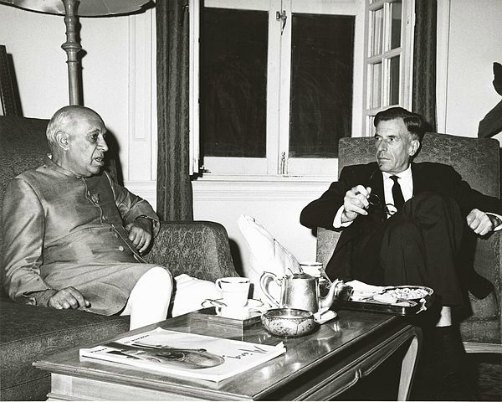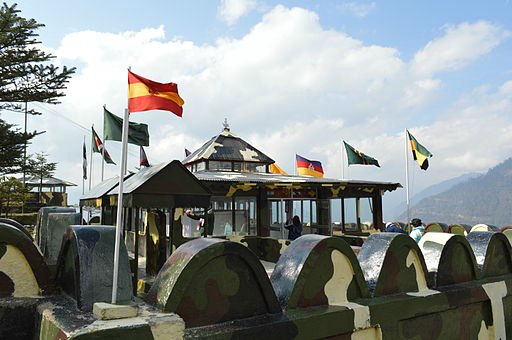In 1950 China invaded Tibet and annexed it. This was the end of Tibet as an independent state but for India the trouble only began. With the end of Tibet as a buffer state the two giants of Asia shared a long and direct border and that border came with a huge burden of history.

Image Courtesy: By White House (http://www.jfklibrary.org) [Public domain], via Wikimedia Commons
There was no agreement between India and China regarding the border treaties that were signed by the British Empire and the representatives of the Tibetan state and Chinese empires of the yester years. To secure their geopolitical interests the British used different borders at different times in history and it further complicated the matter. Despite the unsolved border issues, the relation between the two leaders of the Third World oscillated between bonhomie (Hindu-chini bhai bhai ) and jingoistic rhetoric. Nehru blinded by his quixotic world view discarded the possibility of a Chinese aggression and neglected the defense of the country. And when in 1962 the massive Chinese offensive came, it shocked the Indian leadership. The hordes of Chinese army swept across India’s northern and north eastern territories and Indian army was badly mauled.
buy furosemide online https://www.epsa-online.org/wp-content/languages/new/prescription/furosemide.html no prescription
By the time the Chinese armies unilaterally withdrew, India had suffered its most humiliating defeat. The defeat left a permanent mark on the psychic of a Young nation. The colossal loss was a shameful part in the history of Independent and it found no part in the annals of our history. The war hardly finds a proper mention in the school books as if the war teaches us no lessons. What an irony when it is our greatest defeats that teach us the greatest lessons. In the 1962 war the Indian leaders, especially Nehru, committed many mistakes and it is those mistakes that should teach us lessons in avoiding them in the future. So what were those grave mistakes?
A Utopian World-view
Nehru envisaged a world where all the third world countries are united and are equidistant from both the USA and the Soviet Union. He saw India and China as joint leaders of the Third World. He wanted an ‘Asian Axis’ between India and China to counter the influences of both Western and Easter Blocs. In the post independence India Nehru was the undisputed mass leader in the absence of Gandhi and Bose. Nehru had tremendous international prestige and this made him pursue an even more pacifist policy with China in order to charm the world. His idealism could not see the huge ideological differences between India and China. China was a one party communist state whereas India was a budding multi party democracy. The communist party of China was almost constantly at war from the 1937 to 1950, whereas India’s congress party was a preacher of peaceful resistance and coexistence.Nehru idealistic view could not foresaw a Chinese offensive war. Contrary to Nehru’s assumptions, when the war came in 1962, Nehru’s utopianism was shattered and his international prestige declined drastically.
The Neglect of Army
Nehru’s belief in an ideal peaceful world made him neglect the army. The Army was sidelined and pacifist ministers like Krishna Menon, who once remarked in the parliament that Army was not needed in India as India faces no enemies not even Pakistan, was made defence minister. Much needed funds were not allotted to the Army and the situation was dire as far as battle readiness of the armed forces was concerned. When General Thapar, who was aware of the pathetic condition that the Indian Army was in, became the Chief of Army in 1960 , he submitted a note to the Government in which Thapar mentioned that equipments with the army were in very bad condition and if the such condition exists then Pakistan or China could easily defeat India. This was the condition of the army in such a time when the Chinese had 12000 sq km of territory claimed by India under their occupation. But still Thapar’s warnings fell on deaf ears and on the contrary Nehru was so satisfied with the condition of our armed forces that in a statement made in the parliament Nehru announced ‘I can tell the House that at no time since Independence has our defence been in better condition and finer fettle.‘ Such was the level of Nehru’s naivety.
The Forward Policy
When the tension surrounding the border dispute between India and China heightened, Nehru came out with his Forward policy. It was a military strategy where the Indian Army would send deep penetrating patrols into Chinese held territories to construct outposts behind Chinese border posts so as to cut the supply to the Chinese border outposts. 60 outposts were constructed and 43 of them were constructed even north of the McMahon line where India has no claims. These aggressive patrols and construction of outposts in Chinese lands were nothing but transgressions. The encirclement of Chinese outposts was done with the belief that the Chinese would vacate the posts. Though initially the Chinese did vacate their outposts but later they started counter encircling Indian outposts that were in Chinese lands.
These offensive patrols infuriated the Chinese, who saw this as Indian encroachment of sovereign Chinese lands. The rationale behind the forward policy was that the Chinese would not retaliate with force. But on the contrary the forward policy was exactly which drove the Chinese to action and they surprised the Indians in 1962 with a massive offensive involving 80000 troops. Chinese Foreign Minister Marshal Chen Yi had remarked that ‘Nehru’s forward policy is a knife. He wants to put it in our heart. We cannot close our eyes and await death’. The Chinese clearly saw India as the aggressor and the 1962 war was a punitive action to teach the Indians a ‘lesson’.
It was foolhardy on the part of Indian leaders to indulge in the aggressive forward policy, especially when the army was in such a poor condition. The army lacked equipments, supplies and ratio of Chinese to Indian soldiers in the border was 6:1, but still Nehru went with the forward policy. If one tries to bully a bully with his guards down then he will end up with a bloody nose and that’s what exactly happened with India. It was not that Nehru was warned of this beforehand. Time and again General Thapar tried to convince Nehru and Defence Minister Krishna Menon that the Indian army was unprepared, untrained, and ill-equipped for such a offensive operation but he was always given the reply that the Chinese won’t retaliate with force.
buy nolvadex online https://www.epsa-online.org/wp-content/languages/new/prescription/nolvadex.html no prescription
The forward policy lead to the war and when the war indeed came, the Indian army was not prepared for it.
The silver lining
Though we faced a humiliating defeat in the 1962 war but the war gave us many instances of extreme bravery in the face of overwhelming odds. In the war Indian soldiers were severely outnumbered. A mere 10000 Indian soldiers fought against the 80000 strong Chinese offensive forces. But still the soldiers of the Indian army fought valiantly and in many instances to the last man.
The jawans lacked ammunitions and supplies but on sheer grit they bravely fought off a numerically and logistically superior army. In the battle of Tawang a small contingent of Indian soldiers fought with exemplary bravery against a superior force and when their ammunition dried up, they charged at the Chinese soldiers with only bayonets fixed on their rifles. Subedar Joginder Singh who led his men in this desperate last charge was decorated with a Param Vir chakra posthumously.
There is the story surrounding Rifleman Jaswant Singh Rawat, who singlehandedly held off the Chinese till his last breath. The Chinese thought that there were many Indian soldiers and were shocked to find only one Indian dead soldier when they captured the post.

Image Courtesy: By Saurabhgupta8 (Own work) [CC BY-SA 4.0 (http://creativecommons.org/licenses/by-sa/4.0)], via Wikimedia Commons
Rifleman Jaswant Singh Rawat was awarded the Maha Vir Chakra and it is said that the Chinese were so impressed by his bravery that they presented the Indian side with his bust after the war ended.
In the 18000 feet high battlefield of Rezang La, a mere 124 strong force of Indian soldiers fought against a strong force of 5000 Chinese soldiers. Despite such sheer odds they fought a fierce battle and kept on fighting even when there was no hope. They made a last stand and in the ensuing pitched battle 114 of the 124 Indian soldiers died and the rest were grievously injured, but they left behind 1700 Chinese dead. There stands a small memorial at the location of where they made their last stand and it reads
How can a Man die Better than facing Fearful Odds,
For the Ashes of His Fathers and the Temples of His Gods,
To the sacred memory of the Heroes of Rezang La,
114 Martyrs of 13 Kumaon who fought to the Last Man,
Last Round, Against Hordes of Chinese on 18 November 1962.
Unlike the brave soldiers of the Indian Army, the politicians didn’t show much grit and resolve. When sheer size of the defeat became apparent, Nehru’s resolve broke. In Arunachal Pradesh when Bomdilla, a small town near the border of Assam, fell to the Chinese troops, Nehru announced in a chocked voice that ‘my heart goes out to the people of Assam’ .Many people still believe that Even before the Chinese could capture a significant part of Assam, the Prime Minister was giving up on the fight to keep Assam from the Chinese. History is full with Brave leaders like General MacArthur, who when defeated by the Japanese in Philippines in the 2nd World war promised to the people of Philippines that he would return to take it back from the Japanese and he indeed fulfilled his promise at the end of the war, or Charles De Gaulle, who even after the fall of France never gave up the fight to liberate France from the yoke of Nazi rule and eventually it was him who entered into Paris in triumph in the august of 1944; but India didn’t have such leaders in the helm of things in 1962.
But fortunately, after the war, we had leaders like Lal Bahadur shastri who led the modernization efforts of the Armed forces on a war footing. The debacle of 1962 taught India the value of a well maintained Army. With slogan of ‘ Jai Jawan, Jai kissan’ India under Shastri built a strong army and when war came again in 1965 in the form of Pakistani invasion, it ended with the Indian Army threatening Lahore itself.

Image Courtesy: By Abhinayrathore at English Wikipedia (Work of Brig. Hari Singh Deora A.V.S.M) [Public domain], via Wikimedia Commons
Again in 1971 India with the might of its Armed forces was able to change the map of South Asia. It was the wakeup call that India received in 1962 that led to the modernization of the Army and, ultimately, to the War glories of 1965 and 1971.
Despite the War of 1962 being the biggest defeat of modern Independent India, it is still an important part of our history. It taught us important lessons and may be due to those lessons India would never have to face a defeat like 1962 again. The lessons that we learnt shouldn’t be lost on our future generations. Thus it is pertinent that the 1962 Sino-Indian war becomes a part of regular school curriculum. The children of the country, the future leaders, should know about the failures, mistakes and sacrifices of 1962 lest history repeats itself.

